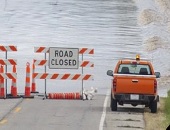Decarb Economics 101
To mitigate the consequences of climate change, the world requires international coordination. In 2015, the Paris Agreement was signed by 195 nations. Its long-term temperature goal is to keep the rise in mean global temperature to well below 2 °C (3.6 °F) above pre-industrial levels, and preferably limit the increase to 1.5 °C (2.7 °F), which would reduce the worst effects of climate change. Many countries are developing policies to get themselves on a path toward achieving the agreed-upon 1.5 °C goal. Although present progress may seem piecemeal, in the words of a Chinese proverb, “A great journey begins with a single step.” The figure below […]
Free the Data
Hurricanes, floods, heat waves, droughts: weather events are increasing in severity as the earth’s atmosphere warms. The consensus is that we need to reduce greenhouse gas (GHG) emissions. Yet recent reports show waning interest in initiatives such as Climate Action 100+. “When performance is measured, performance improves,” according to Pearson’s law, and “when performance is measured and reported back, the rate of improvement accelerates.” Such is the reasoning behind the data repository known as the Net-Zero Data Public Utility (NZDPU). On February 21, 2024, three panelists from NZDPU spoke about the “why” and the “how” of their new organization. The […]
Chemistry and the Economy
Risks are multiplying and becoming more complex. The chemical industry is intrinsically connected to the economy. Can chemistry help solve the biggest crises facing us today? On December 15, 2022, the American Chemical Society hosted a virtual webinar, “Chemistry and the Economy.” The moderator was Bill Carroll, principal of Carroll Applied Science, who spoke to Paul Hodges, chairman of the Swiss-based strategy consulting firm New Normal. In speaking about risks, Hodges does not beat around the bush. He began with what he called “the four horsemen of the apocalypse.” He stated, “First there was the pandemic and associated supply chain […]
Steering the Ship
“Board involvement is pivotal… It’s so much easier to get climate risk capability embedded,” said Jo Paisley, President of the Global Association of Risk Professionals (GARP). “Our survey found the vast majority of boards have oversight of climate-related risks and opportunities.” She was referring to the report titled Third Annual Global Survey of Climate Risk Management at Financial Firms available from the GARP website since September 2021. Paisley and two other panel members were part of the July 12, 2022, webinar to mark the publication of a joint report from GARP and the United Nations Environment Programme Finance Initiative (UNEP FI). […]
Carbon, Cargo, Covid
As we slide into summer 2022, what are the big factors affecting the markets? Carbon, cargo, Covid. Governments and companies are starting to address the excessive carbon dioxide that is causing climate change. Interruptions of the supply chain, heavily dependent on cargo ships, continue to worsen operational risk. Meanwhile, the global economy is still dealing with the Covid-19 pandemic. On May 2, 2022, Derek Walter, head of the Institutional Asset Management Committee at the CFA Society Toronto, moderated two panelists during a webinar to discuss the underlying drivers of market changes. “We need to separate the short-term from the long-term […]
Tools to Fight Global Warming
Investors realize something must be done to mitigate global warming. The financial system needs reliable tools, or performance indicators, that can measure how well financial portfolios align with the Paris Agreement goals. But what, exactly, are these indicators? On April 26, 2022, two specialists described the technical side of measuring portfolio alignment with current efforts to combat climate change. The webinar was sponsored by the Global Association of Risk Professionals (GARP) and was moderated by Jo Paisley, President, GARP Risk Institute. The movement toward portfolio alignment tools (PAT) is an outgrowth from the 26th United Nations Climate Change conference, commonly referred to as COP […]
Six Technologies To Ponder
We live in a time of great challenges yet great innovation. Do you feel overwhelmed with the constant proclamations about what problems need solving most urgently, and what technologies are most effective? Do you seek to invest in new technology that has unrealized potential? On March 17, 2022, Alok Jha, science editor for the Economist, engaged two of his colleagues in a few lightning rounds of “Tell Us About Technology.” The colleagues were Slavea Chankova, healthcare correspondent, and Tom Standage, deputy editor. The three of them gave brief speeches meant to summarize a selected technology and its significance to current […]
The Future of Crypto
What’s been happening in the cryptocurrencies market? Is it all merely speculation or is crypto here to stay? What is the future of broader blockchain technologies? What could regulation mean for the world of decentralized finance (DeFi)? On February 24, 2022, Helen Joyce, Britain editor of the weekly magazine the Economist, posed questions to her colleagues: Alice Fulwood, Wall Street correspondent at the Economist, and Matthieu Favas, finance editor at the Economist, in order to explore the rise of cryptocurrency and its potential consequences. “Blockchain can be thought of as a database distributed across many nodes,” Alice Fulwood said, “one […]
Climate Risk Assessment
Storms, floods, fires, drought: what are the potential hazards threatening the physical assets of different regions? Furthermore, how can we estimate the magnitude of physical risk of each of these under a climate change scenario? “We’ve built infrastructure for certain weather patterns,” said Rohan Hamden, “but now it no longer fits with the weather we are experiencing.” Hamden is the founder and CEO of XDI, the Cross-Dependency Initiative, a company focused on Cross Dependency Analytics to estimate the physical risk to assets of many kinds of hazards. He was invited to share his expertise in physical risk data, modeling, and […]
The New Interventionism
Have you noticed that governments are stepping in more often to regulate things? There appears to be renewed interest in industrial policy. In the words of the magazine The Economist, “governments around the world are becoming bossier to the private sector.” Why is this? What will be the overall effect? On January 20, 2022, Sacha Nauta, executive editor of the Economist, posed questions to her colleagues: Jan Piotrowski, business editor, and Don Weinland, China business and finance editor, in order to explore the rise of state interventionism and its potential consequences. Old versus New “There’s been an increase in the […]










